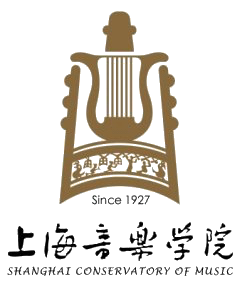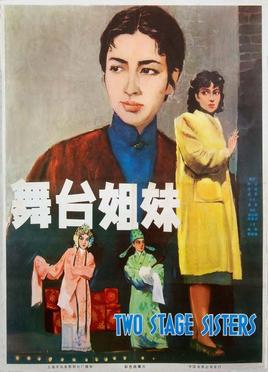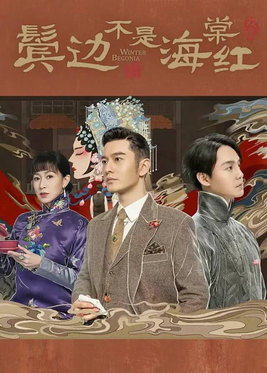
Jiang Qing, also known as Madame Mao, was a Chinese communist revolutionary, actress, and major political figure during the Cultural Revolution (1966–1976). She was the fourth wife of Mao Zedong, the Chairman of the Communist Party and Paramount leader of China. She used the stage name Lan Ping (藍蘋) during her acting career, and was known by many other names. Jiang was best known for playing a major role in the Cultural Revolution and for forming the radical political alliance known as the Gang of Four.

Chinese Opera is a form of theatre in China that combines singing, acting, and elaborate costumes. Topics are based on Chinese history, mythology, and literature. Over its historical evolution, it has incorporated various art forms such as music, song and dance, martial arts, acrobatics, costume and make-up art, and literature. It has highly formalized roles, performed by professional actors each trained for specific roles. Exaggerated features and colors make the roles easily identifiable.

Peking opera, or Beijing opera, is the most dominant form of Chinese opera, which combines music, vocal performance, mime, dance and acrobatics. It arose in Beijing in the mid-Qing dynasty (1644–1912) and became fully developed and recognized by the mid-19th century. The form was extremely popular in the Qing court and has come to be regarded as one of the cultural treasures of China. Major performance troupes are based in Beijing, Tianjin and Shanghai. The art form is also preserved in Taiwan, where it is also known as Guójù. It has also spread to other regions such as the United States and Japan.

The Shanghai Conservatory of Music is a municipal public college in Shanghai, China. It is affiliated with the City of Shanghai. The university is part of the Double First-Class Construction.

Lin Li-hui, better known by her stage name Shu Qi, is a Hong Kong–Taiwanese actress and model.

Mei Lan, better known by his stage name Mei Lanfang, was a notable Chinese Peking opera artist in modern Chinese theater. Mei was known as "Queen of Peking Opera". Mei was exclusively known for his female lead roles (dan) and particularly his "verdant-robed girls" (qingyi), young or middle-aged women of grace and refinement. He was considered one of the "Four Great Dan", along with Shang Xiaoyun, Cheng Yanqiu, and Xun Huisheng.

Fujian White Crane, also known as White Crane Style is a Southern Chinese martial art that originated in Yongchun County, Fujian (福建) province. According to oral tradition, the style was developed by Fang Qiniang, a female martial artist. It is associated with traditional fighting techniques, including long range, but is most similar to close-quarter or hand-to-hand combat. It is most recognizable by the way the fighter imitates a bird's pecking or flapping of wings. While some white crane styles make use of traditional weapons, others have discontinued the use of weaponry.

Zhou Xinfang, also known by his stage name Qilin Tong was a Chinese actor and musician who was a Peking opera actor who specialized in its "old male" roles. He is considered one of the greatest grand masters of Peking Opera of the 20th century and the best known and leading member of the Shanghai school of Peking opera. He was the first director of the Shanghai Peking Opera Company.
Wen Kezheng was a Chinese operatic bass and music educator. Known for his rich and deep voice, he has been known as the "Chinese Chaliapin" and dubbed by the domestic classical music community as the "King of Basses". As an educator, he is best known for his long-time association with the Shanghai Conservatory of Music and headed the Department of Vocal Music and Opera. He also served as the fourth director of the Chinese Musicians' Association.
Li Lingyu is a Chinese singer and actress.
In People's Republic of China (1949–), revolutionary operas or model operas were a series of shows planned and engineered during the Cultural Revolution (1966–1976) by Jiang Qing, the wife of Chairman Mao Zedong. They were considered revolutionary and modern in terms of thematic and musical features when compared with traditional Chinese operas. Many of them were adapted to film.

Two Stage Sisters is a 1964 Chinese drama film produced by Shanghai Tianma Film Studio and directed by Xie Jin, starring Xie Fang and Cao Yindi. Made just before the Cultural Revolution, it tells the story of two female Yue opera practitioners from the same troupe who end up taking very different paths in their lives: "one succumbs to bourgeois affluence and privilege, while the other finds inspiration and fulfilment in the social commitment associated with the May Fourth movement and the thought of Lu Xun.” The film documents their journey through abusive feudal conditions in the countryside before achieving success and prestige on the stage, meanwhile historically following Shanghai's experience under Japanese and KMT rule. This original screenplay depicts the socio-political changes encompassing China from 1935-1950 through the theatrical world of Shaoxing, and accordingly mixes both a Chinese aesthetic with Hollywood and socialist realist forms. The main protagonist is said to be based on the life of Xie Jin's friend and opera-veteran Yuan Xuefen.

Yue opera, also known as Shaoxing opera, is a popular Chinese opera genre. Only Peking opera is considered more popular nationwide.

Mei Baojiu was a contemporary Chinese Peking opera artist, also a performer of the Dan role type in Peking Opera and Kunqu opera, the leader of Mei Lanfang Peking Opera troupe in Beijing Peking Opera Theatre. Mei's father Mei Lanfang was one of the most famous Peking opera performers. Mei Baojiu was the ninth and youngest child of Mei Lanfang. For this reason, he was called Baojiu, since in Chinese, jiu means nine. Mei Baojiu was the master of the second generation of Méi School descendant, he was also Mei Lanfang's only child who is now a performer of the Dan role of the Peking Opera.

Yu Kuizhi is a Peking opera performer of Hui Chinese ethnicity. He plays the role of elderly men (laosheng) in Peking Opera.
Xiao Wenyan (1922–2013) was a Chinese Huai opera artist.

Xie Fang is a Chinese actress and author. She is best known for her involvement with pre-Cultural Revolution cinema.
Li Shuzhen, better known by her stage name Li Yuru and also known as Li Xueying, was a Chinese opera singer and actress. Descended from Manchu nobility, she is remembered as "one of the great Beijing Opera performers" and played an important role in the acceptance of female singers in female roles (dan). Amid the Cultural Revolution, she was imprisoned from 1966 until the early 1970s. In 1979, she married Cao Yu, one of the most important 20th-century Chinese dramatists, and, following China's opening up under Deng Xiaoping, she ended her life respected as one of the few surviving masters of the dan roles.
Li Shengsu is a Chinese Peking opera singer-actress who plays Dan roles. She began performing traditional Chinese opera from a young age and is a student of Mei Baojiu and other famous opera performers. She is widely considered a Peking opera superstar and has many renown performances. Currently, Li Shengsu is the director of Troupe One of China National Peking Opera Company. Li also holds positions in other organizations as well, including being a member of the Chinese People's Political Consultative Conference. She has received multiple awards and recognition for her performance in Peking opera.

Winter Begonia is a 2020 Chinese television series starring Huang Xiaoming, Yin Zheng, and Charmaine Sheh, based on Shui Ru Tian Er's BL web novel of the same name. It aired exclusively on iQiyi and tells the story of the close relationship between a shrewd businessman and a Peking opera genius right before the World War II. While the original web novel depicted the relationship between the two main men as romantic, the adaptation changed this depiction into a "bromance".














